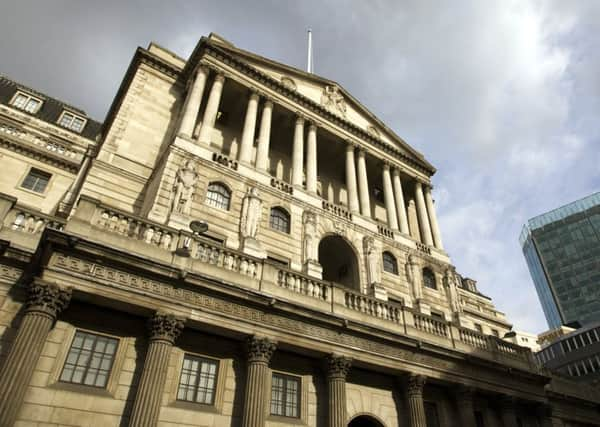Bill Jamieson: Can the BoE resist inflation trigger?
This article contains affiliate links. We may earn a small commission on items purchased through this article, but that does not affect our editorial judgement.


But at almost every inflection point, closer examination reveals changes in market sentiment ahead of the ‘event’: so that the trigger is less the cause of a change of direction but a confirmation.
I sense we are in just a period now. After the “Trump Bump” and the relief rally in the UK after the vote to leave the EU (the sky didn’t fall in, the economy did not implode, employment kept rising), the mood in markets is shifting.
Advertisement
Hide AdAdvertisement
Hide Ad• READ MORE: Cost of living fears mount as inflation hits 2.3%
Such a re-think is inevitable after a strong performance in markets. In America, the Dow Jones Industrial Average has risen from a low last June of 17,140, swept through the 20,000 barrier for the first time in its history and now stands at 20,596, a gain of 20 per cent. Here in the UK, the FTSE 100 Index is up from a June low of 5,923 to 7336, an exhilarating rise of 23 per cent.
But it’s not just the scale of these recent gains that now merits reappraisal. It is also the valuation levels to which equity indices have been swept. Fund managers believe that US equities are the most overvalued since the dot-com era.
A survey by Bank of America Merrill Lynch finds that 81 per cent of respondents believed that US stocks are overvalued, and that there may be a March or April risk rally “pause.” The last time they were this overvalued was in 2000, the height of the dot-com bubble. Anxious fingers point to extreme valuation levels, with the US S&P 500 Index standing on a price/earnings ratio of 25 times – well above the long run average. Here in the UK the FTSE100 is on a P/E ratio of 30 times – also well above the long term average. A potential trigger point is the gap between what President Donald Trump promised and what he is capable of delivering. It did not take long to materialise.
The hope was that a combination of corporate (and household) tax cuts combined with a big boost to government infrastructure spending would fuel a powerful “reflation trade”. But last week’s failure to win support in Congress for the bill to repeal Obama care dealt a blow to such hopes – and the US market was quick to react.
Last week the Dow Jones dropped 1.5 per cent and the S&P broke a streak of more than 100 days without a one per cent fall. And while the macro economics news in Britain continues to show resilience, the invoking of Article 50 will spark fresh concerns over the future of UK trade with the EU.
But in my view there is a bigger trigger point – one that will not be a surprise but the arrival of which will still come as a shock. It is the onset of inflation – and with it the upward move in interest rates as central banks try to mitigate the impact on financial and consumer behaviour.
Advertisement
Hide AdAdvertisement
Hide Ad• READ MORE: Shoppers are hit in the pocket as sterling slumps
The past decade with historic falls in both inflation and interest rates has inured us to how toxic and wealth corrosive inflation can be. And once it takes hold, attempts to control it, as we found through the 1970s and 1980s, can be akin to taming a tiger by clinging to its tail.
Last week brought news that the consumer prices index hit 2.3 per cent in February, compared with a 1.8 per cent annual increase the month before. More remarkable is the jump in the still popular but officially pooh-poohed retail prices index: this is now running 3.2 per cent higher than a year ago. Higher inflation erodes the real value of savings, with returns on most fixed interest stocks and bank deposit accounts even more “real terms” negative than before. And it corrodes the spending power of pay.
While the pound’s weakness has contributed, inflation is also rising both in the US and continental Europe, so it cannot solely be blamed on the Brexit-induced fall in sterling. Roughly two thirds of the inflation rise since the Brexit vote is due to rising fuel and food prices.
For the moment the Bank of England is on “hawkish hold”. But how long can a rate rise be postponed – particularly now that the Bank’s own forecast of an inflation peak of 2.8 per cent in mid-2018 is likely to be overshot and that the National Institute for Economic & Social Research is forecasting an inflation peak of 3.7 per cent? That “sudden, unforeseen” market trigger may be closer than we think.
• The Scotsman Conference – Investing in a post-Brexit World – is being held tomorrow at the Hilton Grosvenor Hotel, Haymarket, between 8am and 10:30am. Fee of £20 plus VAT includes tea, coffee and canapes. A few tickets are still available – go to www.scotsmanconferences.com or email [email protected]